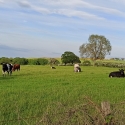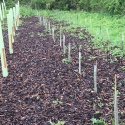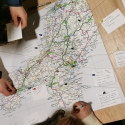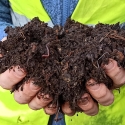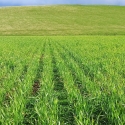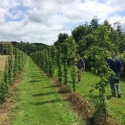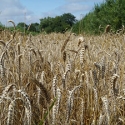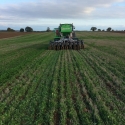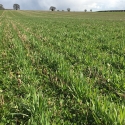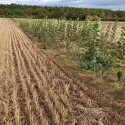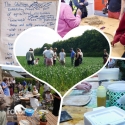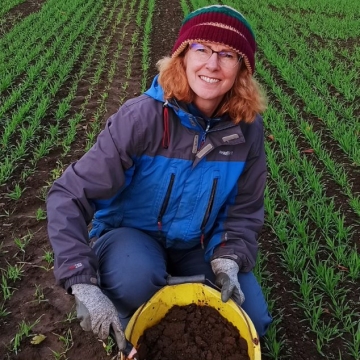
Julia Cooper
Job title:
Academic qualifications:
- BSc Agr. Major: Soil Science, Minor: International Agriculture, University of Guelph, Canada
- MSc Biology, Thesis: Fertilization with fresh and composted chicken manure: Effect on soil fertility and mixed hay quality, Dalhousie University, Canada
- PhD Biology, Thesis: The role of temperature in C and N mineralization from selected arable Nova Scotia soils, Dalhousie University, Canada
Role and responsibilities:
I lead research activities at ORC relating to the diversification of cropping systems as a key component of agroecological production systems. I am particularly interested in how we can design cropping systems that meet multiple objectives of building soil quality, mitigating climate change, enhancing biodiversity, and optimizing water quality while providing sustainable livelihoods for UK farmers.
Research projects
Research interests:
My area of expertise is soil C and N cycling in agricultural systems with an emphasis on agroecological strategies for improving soil health and nutrient use efficiency. I am interested in using our understanding of the fundamental biological processes that happen in agricultural soils to design cropping systems where C and N cycle to optimize crop production and health and minimize environmental impacts.
Since joining ORC in 2023 I have been involved in a range of projects that relate to this theme. The Living Mulches project seeks to address a real challenge in organic and conventional arable systems: how to develop systems with reduced or no-tillage, without relying on herbicides. In LiveSeeding we are testing wheat and bean varieties with organic farmers that are adapted to non-synthetic sources of nutrients. The new Feed the Soil project explores novel ways of managing organic wastes to supply nutrients to crops and build soil health. And the Rapid Evidence Assessment on regenerative agriculture project is building a picture of the many challenges facing regenerative farmers in the UK so that future research and knowledge exchange activities can be focused on these major barriers. Finally, Joining the Dots is a truly participatory action research project where we are working directly with growers in Cornwall to design a sustainable and agroecological food system.
All of the work I do at ORC is participatory with farmers involved in co-designing the research and solutions to their challenges. This has proven to be effective and incredibly rewarding.
Interests outside of ORC:
I am a keen allotment gardener where I enjoy putting my knowledge about composting and soils to practical use in the vegetable patch. I also always have a few backyard hens that keep us supplied with eggs. I like to be active and I spend a lot of time on the tennis court, although this doesn’t translate to much match success! I am active on Twitter where I follow many innovative farmers and scientists and try to inject a bit of realism into some of the interesting discussions around crop diversity and soil health. Follow me there: @JuliaSoilsister
Listen to a wide-ranging interview with Julia on the Pasture Pod (September 30 2024) Interview: Dr Julia Cooper. Soil fun.
Publications:
- Zani CF, Manning DAC, Abbott GD, Taylor JA, Cooper J, Lopez-Capel E (2023) Diversified crop rotations and organic amendments as strategies for increasing soil carbon storage and stabilisation in UK arable systems Frontiers in Environmental Science 11, 493
- Zani CF, Abdalla M, Abbott GD, Taylor JA, Galdos MV, Cooper JM, Lopez-Capel E (2023) Predicting Long-Term Effects of Alternative Management Practices in Conventional and Organic Agricultural Systems on Soil Carbon Stocks Using the DayCent Model Agronomy 13 (4), 1093
- Zani CF, Lopez‐Capel E, Abbott GD, Taylor JA, Cooper JM (2022) Effects of integrating grass‐clover leys with livestock into arable crop rotations on soil carbon stocks and particulate and mineral‐associated soil organic matter fractions in conventional and organic systems. Soil Use Manag. 38, 448-465.
- Moulton-Brown C, Feng T, Kumar SS, Xu L, Dyhtam C, Helgason T, Cooper JM, Moir JWB (2021) Long-term fertilization and tillage regimes have limited effects on structuring bacterial and denitrifier communities in a sandy loam UK soil. Environmental Microbiology 24(1), 298-308.
- Zani CF, Gowing J, Abbott GD, Taylor JA, Lopez-Capel E, Cooper J (2021) Grazed temporary grass-clover leys in crop rotations can have a positive impact on soil quality under both conventional and organic agricultural systems. Eur J Soil Sci 72(4):1513-1529.
- Cooper J, Reed EY, Hörtenhuber S, Lindenthal T, Løes A-K, Mäder P, Magid J, Oberson A, Kolbe H, Möller K (2018) Phosphorus availability on many organically managed farms in Europe. Nutr Cycl Agroecosystems 110:227-239
- Swain EY, Almadni M, Leifert C, Stockdale EA, Cooper JM (2016) NDICEA calibration and validation on a northern UK soil. Org Agr 6 (4):267-280.
- Cooper J, Baranski M, Stewart G, Nobel-de Lange M, Bàrberi P, et al (2016) Shallow non-inversion tillage in organic farming maintains crop yields and increases soil C stocks: a meta-analysis. Agr Sustain Dev 36 (1):1-20.
- Li J, Cooper JM, Lin ZA, Li Y, Yang X, Zhao B (2015) Soil microbial community structure and function are significantly affected by long-term organic and mineral fertilization regimes in the North China Plain. Appl Soil Ecol 96:75-87Orr CH, Stewart CJ, Leifert C, Cooper JM, Cummings SP (2015) Effect of crop management and sample year on abundance of soil bacterial communities in organic and conventional cropping systems. J Appl Microbiol 119 (1):208-214.



